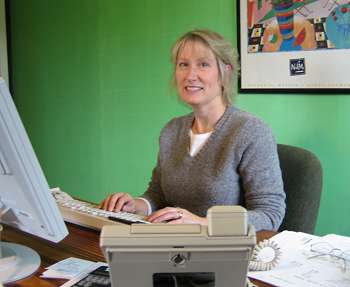- By Dan Veaner
- Around Town
 Print
Print VanApeldoorn works for a Syracuse-based company called E-Rate Exchange that specializes in filing forms for school systems to get federal grant money for Internet access and communications, part of the 'No Child Left Behind' program. Her boss and the other employee, a Florida woman, work from home offices as well. She had worked with her boss, Shari Dwyer, at a former office job. Dwyer left to start her company and when it became busy she asked VanApeldoorn to join her. Getting the job this way addressed the issues of trust and of interviewing. "I knew Shari before I started working for her," says VanApeldoorn. "So it wasn't an issue of her not knowing me or how I worked."

"I like working from home a lot," she continues. "And I like working for Shari. I don't know if I didn't like working for Shari whether I'd like working from home." The company provided her computer, printer, and scanner. VanApeldoorn provided her own phone, Internet access and office furniture. "She's pretty good to me in other ways, so I have no complaints," she says.
Adjusting to working at home can be difficult, but it hasn't presented major problems for VanApeldoorn. "I lived alone for a long time. I've always been pretty good at being able to entertain myself, and most of my hobbies are home based. I like gardening and crafts, so that keeps me here," she says.
The adjustment has gone smoothly for her husband, Paul Kempes who is the optometrist at Sterling Optical, though she suspects it took him some getting used to. "He had all morning in the house all to himself and now he doesn't have that. He won't really say that it's taking some adjusting, but I would think it would have to. The morning was his time, and now I'm here."
The flexibility of her job also offers advantages. She normally works three days a week, but this grows to 4+ during the busy period. She says she wants to start a flower business. Spring and summer are slow for E-Rate Exchange, which will make work out perfectly, because the best times for the two seasonal businesses do not conflict.
Her work involves interacting with clients on the telephone and filling out the paperwork. "The forms are unbelievable," she says, "and sometimes somewhat tedious and complex to fill out. School districts quite often start doing it themselves and then they find it is too overwhelming. They're stretched for staff as it is. They outsource it to us. The reimbursements are significant enough that they can pay us to do it and still get a substantial amount of money back."
Managing the routine and daily people interaction has taken some getting used to. "The hardest part of my day is making sure I stay structured. It took me longer than I thought to adapt. There'd be some distraction or something calling to me or whatever. The hardest part for me is not having that daily interaction with the same people. You don't know the little inside jokes, the things you used to know."
She compensates for this by staying in touch with colleagues and friends using instant messaging on her computer, and by having lunch with someone a couple of times a week. She also plans to get into an exercise class or something similar that meets on the same days with the same people.
These adjustments are worth it. "If I need to schedule a doctor's appointment I just work my day around it," she says. "I don't have that 20 minute drive downtown and back, which is nice. Life is good working from home. I'm a much more relaxed person than I was working in the office. And the dog seems to like me being home more."
----
v2i2



